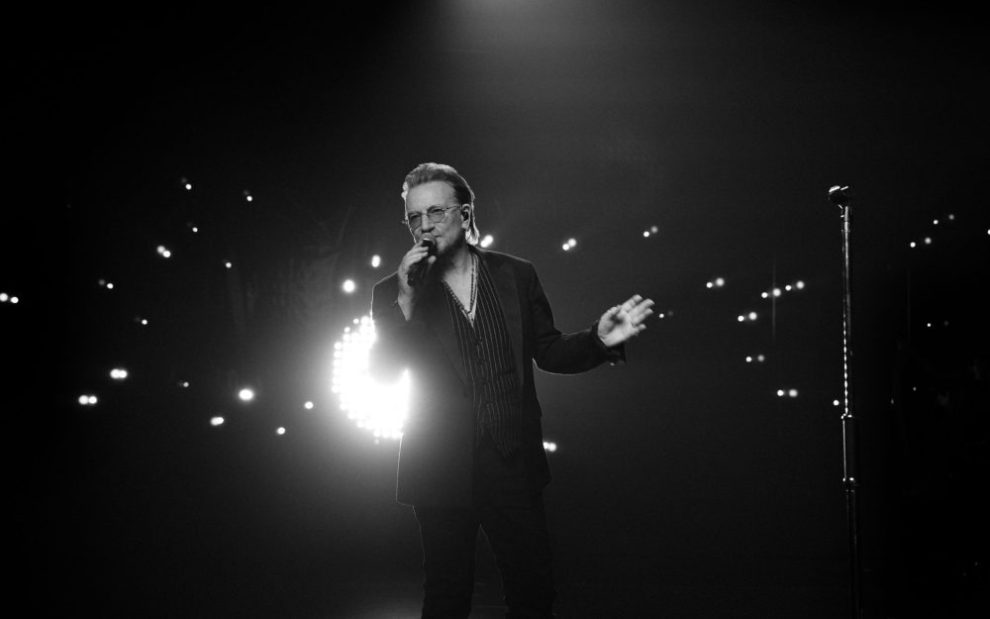Bono, the lead singer for Irish rock band U2, has been an inescapable pop cultural presence for at least 40 years. At first U2 was a bit of a man-bites-dog story, the rock band in which all but one member was a devoted Christian. As Bono’s image evolved over the decades, he became as well-known for his activist work seeking justice for the global poor as he was for his music or his religion. He also collected a legion of critics who see him as a pompous egomaniac.
So, of course, when Bono (real name Paul David Hewson) published an autobiography, Surrender: 40 Songs, One Story (Knopf), it had to clock in at a mammoth 557 pages. And for his promotional book tour, he couldn’t just read excerpts and sell autographed copies. Instead, he concocted a one-man stage presentation, complete with a light show and hired musicians that allowed him to burst into song at appropriate points in the narrative. For three weeks, that show, Stories of Surrender, performed at New York’s Beacon Theater. It was filmed by Apple TV+, which then produced a documentary using the footage. Now the book tour has become a movie, which debuted at the Cannes Film Festival and started streaming on Apple TV+ May 30.
Many of the jibes from Bono skeptics are richly deserved. The man himself regularly jokes about his messiah complex and the hypocrisy of his lavish lifestyle. And the book version of Surrender provides plenty of evidence for the prosecution: It often takes the reader from one exotic locale to another and details fancy dinners and heartfelt conversations with this movie star and that billionaire. The 86-minute one-man show distilled from Bono’s book, however, mostly avoids those annoying elements. Instead, the movie, filmed in black and white, aims an intense, intimate focus on the story of the Hewson family, especially on Bono’s relationship with his late father, Bob. This provides drama enough to sustain the story, and then some.
Iris Hewson, Bono’s mother, died when he was 14, shortly after suffering a cerebral aneurism during the funeral of her own father. After his mother’s death, Bono tells us, his father never spoke of her again, and neither did her two sons. The three male survivors existed in the same house, closed off from one another and from their grief. Bono’s deliverance from this peculiar circle of hell came two years later when, in the same week, he met the woman to whom he is still married and the three men who are still his bandmates.
After U2 made it big and Bono was rich and famous, he met his father regularly for a drink at the local pub. In these scenes, Bono plays both himself and his father, changing character and becoming the older man simply by turning his head and altering his voice. Here lies the emotional core of the film and a new window on Bono’s gifts as a performer. Bob Hewson loved to sing, especially opera. But he never encouraged his younger son along these lines, and, for years after Bono became a successful singer, Bob dismissed him as a “baritone who thinks he’s a tenor.”
Of course, everything about Bono: Stories of Surrender, from the mingling of book excerpts with related songs to the father-and-son story at its heart, invites comparison to Springsteen on Broadway, the one-man show that the Boss performed after the publication of Born to Run, his own epic memoir. But that comparison only serves to emphasize the fact that these two men may be the only performers from their corner of the culture who could effectively pull off this kind of show. To me, at least, that’s what redeems Bono’s well-known faults: As both an artist and activist, he delivers.
U2 reinvented its sound several times over the decades and has remained relevant well into the 21st century. As an activist, Bono played a major part in getting George W. Bush to fund the U.S. President’s Emergency Plan for AIDS Relief (PEPFAR), which has saved millions of lives in Africa, and in persuading Western nations to cancel more than $100 billion in debt owed by poor nations of the global South.
However, Bono’s effectiveness as an activist is limited by his ideological blinders. While his religious faith, and the way he talks about it, is often supremely nuanced and sophisticated, Bono’s faith in free market economics and the benevolence of billionaires strains credulity. Throughout his autobiography, he unconditionally praises the likes of Bill Gates, Warren Buffett, Steve Jobs, and Jobs’ Apple successor, Tim Cook. Elsewhere, he’s even claimed that “entrepreneurial capitalism” is the way out of global poverty.
Early in this century, Bono joined some of his Silicon Valley buddies in Elevation Partners, an investment group named for a U2 song. One of Elevation’s big investments was in Forbes Media, publisher of the business magazine that promotes extreme free market ideas such as abolition of the minimum wage. Elevation was a big early investor in Facebook (now Meta) and still is, despite all we’ve learned about the harm the company does. U2’s cozy relationship with Apple goes back to their 2004 iPod commercial and continues with the production of this movie. This despite Apple’s longstanding entanglement with China, the world’s biggest violator of human rights and labor rights.
There’s a lot to love about Bono and about Bono: Stories of Surrender. But when Bono starts preaching about capitalism, it’s best to tune out the sermon.
This article also appears in the August 2025 issue of U.S. Catholic (Vol. 90, No. 8, pages 36-37). Click here to subscribe to the magazine.
Image: Apple TV+















Add comment